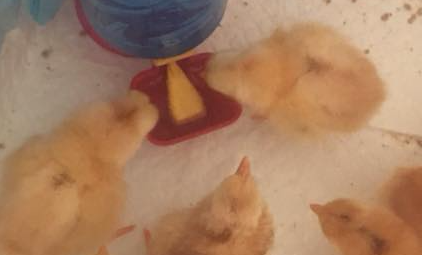What to Feed Baby Chicks for Healthy Growth
What to Feed Baby Chicks for Healthy Growth
Raising healthy baby chicks starts with giving them the right food and environment from day one.
Knowing what they need—and just as importantly, what to avoid—can make all the difference in their development.
To keep things simple, this guide covers the essentials on feeding, hydration, and supplements to get your chicks off to a great start. Whether you’re raising a few backyard chickens or expanding your flock, this advice is based on real know-how to help your chicks grow strong and healthy.
Key Takeaways to Know about Feeding Chicks
- First 24 hours: Chicks don’t need food or water right away after hatching, so don't give them food or water in the first 24 hours.
- Teach eating and drinking: Chicks may need guidance to find and understand their food and water sources if you are raising them by yourself.
- Buy medicated chick starter feed: Look for a chick starter feed with 18-23% protein to support rapid growth. Medicated feed contains amprolium to prevent coccidiosis.
- Avoid treats initially: Stick with a quality starter feed to prevent any nutritional gaps in early growth.
- Water safety: Use a chick-safe drinker to avoid drowning and contaminated water.
- Supplements and vitamins: Chicks benefit from vitamins A, D, E, B-complex, and minerals like calcium and phosphorus.
- Clean brooder environment: Hygiene is key to preventing illness - consider adding apple cider vinegar or probiotics to their water.
First 24 Hours
For the first 24-72 hours, chicks don’t require food or water as they are still absorbing nutrients from their yolk sac.
This natural source provides enough protein, vitamins, and minerals to sustain them, helping the chicks gain strength without any additional feeding.
So, in those first hours, focus on keeping them warm and safe as they adjust to their new environment. This can be done by keeping your chicks in a brooder with an appropriate heat source like a brooder heat plate or heat lamp.
Teaching Chicks to Eat and Drink
Once you’re ready to introduce food and water (after 24-72 hours of hatching), it’s important to show chicks how to access their feeder and drinker, especially if a mother hen isn’t around.
In a natural setting, chicks learn by mimicking their mother’s behavior. She’ll cluck softly, scratch around to expose food, and dip her beak in water to show them where and how to drink.
But when there’s no hen around, you’ll need to step in and gently teach them.
Here’s how to guide your chicks:
- Introduce Them to Water First: After placing them in the brooder, gently dip each chick’s beak into their waterer for a second, then release. This helps them understand where the water is and how to access it. Make sure to use a shallow drinker or a lubing cup drinker like ours designed for chicks to prevent drowning.
- Sprinkle Some Feed Nearby: Start with a small amount of chick starter crumble on the floor of the brooder or on a shallow plate, so it’s easy for them to spot and peck at. You might even tap at the feed with your finger, mimicking a pecking motion, which can encourage them to start eating.
- Use the Right Feeder: Setting up a feeder that’s the right size and height for chicks can also make a big difference. Our small chicken feeder is perfect for this purpose, as it’s easy for them to access without spilling. Position the feeder at eye level for the chicks so they can comfortably reach their food.
By guiding them initially, you’re helping them develop a natural routine of eating and drinking, which they’ll continue independently as they grow.
This little bit of attention in the early days can go a long way in setting them up for a healthy start!
We posted this cute video on our Facebook page about chicks learning how to use a waterer - check it out!
Choosing the Right Chick Starter Feed
Chick starter feed is the best choice for young birds, ideally formulated with 18-23% protein, which is critical for their growth during these early weeks.
Here’s a breakdown of what a good starter feed should include:
- Protein: 18-20% for muscle and feather development.
- Fat: Around 3% for energy.
- Fiber: 4-5% to aid digestion.
- Vitamins: A balanced starter should include vitamins A (for vision), D (for bone health), E (immune support), and a B-complex to promote healthy metabolism.
- Minerals: Key minerals like calcium (for bone growth) and phosphorus should be present.
This balance of nutrients makes commercial starter feeds preferable to homemade mixes, which may lack essential nutrients in the right quantities.
Medicated vs. Unmedicated Chick Starter Feed: Coccidiosis Prevention for Chicks
Medicated chick feeds often contain amprolium, which helps prevent coccidiosis—a common and sometimes deadly parasite infection in young chicks.
Medicated feed is typically suitable unless your chicks have been vaccinated for coccidiosis, in which case, an unmedicated starter may be better. But medicated feed is not harmful even if your chicks have been vaccinated.
For peace of mind, confirm with your feed supplier or vet if unsure.
Avoiding Homemade Feeds and Treats
It can be tempting to mix up a homemade feed or toss a few treats their way, but homemade mixes often miss key nutrients.
We at Dine-A-Chook never recommend making homemade feed for chicks!
Stick with a commercial starter feed to keep their diet balanced and safe.
Also, for the first month, avoid treats that can interfere with essential nutrients. Fresh greens and small seeds may seem harmless, but they can reduce your chicks’ intake of protein and critical vitamins in the starter feed, affecting their overall development.
Water Safety for Chicks: Tips for Clean, Accessible Hydration
Young chicks need clean water available at all times after the first 24 hours, and the best way to provide this is with a chick-safe drinker to prevent spills, drowning, or contamination.

In this picture, chicks are drinking from our lubing cup drinker.
Position the drinker close to their starter feed to encourage hydration.
Don't add sugar or other additives to the water, as these can upset their digestion in the early stages. Some mineral and vitamin supplements in the water source can be OK, and we'll list those next!
For more advice on water requirements, check out our article How Much Water Do Chickens Need.
Supplements and Vitamins to Prevent Deficiencies
While a high-quality chick starter feed generally meets all their nutritional needs, some chicks may benefit from additional vitamin support, especially if they show signs of deficiencies.
Below are common supplements to consider, particularly if you’re seeing weak growth or issues in your flock:
- Vitamin A – Essential for eye health and growth. A deficiency can lead to poor vision and stunted growth.
- Vitamin D – Critical for calcium absorption, which supports strong bones. Chicks lacking vitamin D may develop soft bones or rickets.
- Vitamin E – Important for immune health and muscle function. Deficiencies can cause muscular issues like weakness or loss of coordination.
- B-Complex Vitamins – Supports metabolism, energy levels, and nervous system health. A deficiency, particularly in vitamin B1 (thiamine), may cause leg weakness or paralysis.
- Calcium and Phosphorus – Necessary for bone development. While chicks don’t need as much calcium as laying hens, a small amount in their starter feed helps with skeletal strength.
If you notice symptoms like leg weakness or delayed growth, you can use a poultry-specific vitamin supplement in their water. Be sure to follow the instructions carefully to avoid overdosing, as too many vitamins can be just as harmful as too few.
In addition to clean water, you can add a small amount of apple cider vinegar (1 teaspoon per liter of water) to support their immune system and balance gut bacteria.
Probiotics are another useful additive, especially if your chicks are stressed or exposed to new environments. Probiotics promote healthy gut flora, which is essential for nutrient absorption and overall health.
Avoiding Toxic Foods and Unsafe Substances
When feeding chicks, stick strictly to chick starter feed and avoid foods that could harm them.
Here’s a quick list of items to avoid:
- No processed foods – These are often too salty or sugary for chicks.
- No raw beans – Contain toxins that are dangerous for young birds.
- Avoid chocolate and avocado – Both contain compounds that can be fatal to chickens.
- No moldy or spoiled food – Can introduce dangerous fungi and bacteria.
See our full list of foods chickens cannot eat.
Keep the Brooder Clean to Avoid Health Issues
One of the simplest ways to keep your chicks thriving is to keep things clean. Dirty bedding and feed dishes can lead to nasty infections. Here’s a few quick tips:
- Change the bedding every day or two – Damp, dirty bedding’s a breeding ground for bacteria, which you don’t want anywhere near your young birds.
- Scrub feeders and drinkers – Give them a quick rinse daily to keep everything fresh and prevent bacteria from building up.
- Fresh air – Keep the brooder ventilated to stop ammonia buildup from their droppings.
- Avoid overcrowding – Give them space to run around. Packed-in chicks are stressed chicks, and stress can make them sick.
By keeping the brooder clean, you’ll help prevent nasty stuff like coccidiosis, which can spread fast in a crowded, dirty space.
Helping Chicks Grow with the Right Feeder and Drinker Setup
The right setup makes a big difference. When they’re little, they need easy access to food and water at their level. Our small chicken feeder is a great size—it keeps their food in reach and reduces spills. As they grow, you can adjust the height so they aren’t bending down too much.
And make sure their drinker’s chick-safe, too. Open water dishes can lead to wet, messy disasters and even drownings. The drinker should be easy to access without the risk of them hopping in or knocking it over.
Tips for Keeping Your Flock Healthy as They Grow
As your chicks mature, their dietary needs will shift, requiring adjustments to their feed and supplement regimen.
By following the steps above, you’re laying a strong foundation for their health and growth. Over the next few months, monitor their progress, adjust the feed type when necessary, and continue with good hygiene practices.
For more on chick feeding and other poultry care tips, visit our Dine-A-Chook blog, or check out How Much to Feed Chickens per Day for advice on feeding as they grow.
Ready to Raise Healthy Chicks?
Starting your chicks on a solid nutrition plan is a big step toward a thriving flock. If you need chick feeders, drinkers, or even a bit more advice, explore our collection of feeders and drinkers, designed to grow with your birds.
For any questions, contact us – we're here to help every step of the way!






